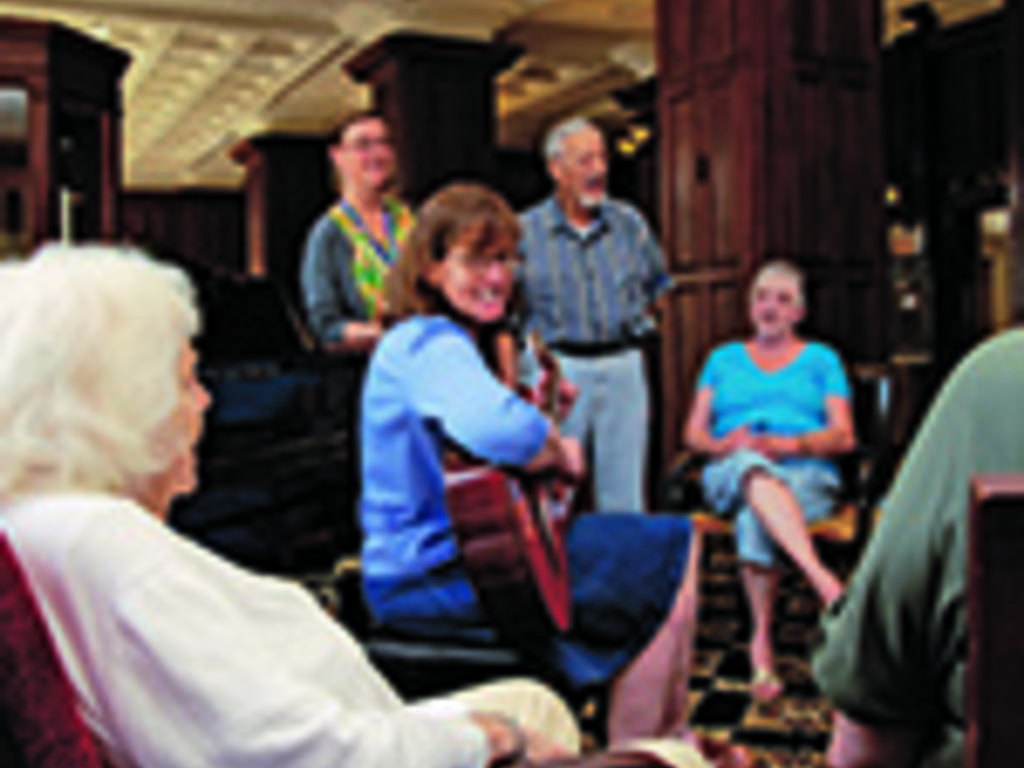By Lesley Young
As a business major at Rhodes College, Justin Genter ’14 never planned on dragging a yoga mat to a music class. Thanks to his baseball teammates’ recommendation, however, he found himself doing just that when he enrolled in Dr. Mona Kreitner’s Music and Healing class.
“We did some guided imagery where we brought yoga mats to class and Dr. Kreitner played a certain type of music to get our mind in a situation to open up,” Genter, of Los Angeles, says.
The guided imagery started with the students imagining themselves at the bottom of the stairs, climbing a stair with each deep breath, and opening a door to wherever they want to be. Once Kreitner, an assistant professor of music, led her students through the guided imagery, Genter found himself playing a better baseball game. “During practice my muscles were way looser. I was more fluid and relaxed.”
Kreitner first offered the course in 2012 thinking it would serve as a topics class, but each year, undergraduates like Genter’s friends spread the word, and the class gained in popularity. “I have a bachelor’s degree in music therapy, but I pursued graduate studies in other things,” she says. “I was very excited to get back into connecting music to healing and psychology. I thought the students would get excited about it, which they did.”
Kreitner introduces students to the idea that music is more than an art or a craft, that it is more than listening or going to concerts and more than taking lessons or playing in a band. Music is a form of communication.
“It is a way of expressing things and drawing people together. It can facilitate interpersonal relationships, which serves as a jumping off point relating music to wellness,” Kreitner says.
“Students are able to express themselves, and a lot of barriers come down. They can express things they can’t put into words.”
The most popular component of the class with many of the students is the assigned service portion. Each week students visit either Hope House, which offers services to children affected by HIV/AIDS, or the Parkview, an independent living community for seniors.
“That was the most interesting thing we did. I would go to the Parkview and lead the residents to interact musically,” Sarah Catanzaro ’16, a music major, says. “They loved playing music, and it had a really calming effect.”
Genter, who visited Hope House, noticed the effects of music on the children with whom he spent time. “You could really see how much the kids changed over the 10-week span. They went from being shy and reserved to giving you hugs and high-fives when you walked into the room. They really came out of their shells. It was fun to see them having so much fun,” he says.
Kreitner hopes to include another establishment in her clinical services component this fall—the Memphis VA Medical Center. “My friend is a psychologist there who works with veterans with post-traumatic stress disorder. I hope to start a drum circle there. We could do great work with veterans,” Kreitner says.
The fact that students have the opportunity to experience in her classroom what they then share in the community hits home. “Learning about music without performing or listening to it is not effective. In class, we were able to learn how it heals in a very personal and intimate way, and that it’s something you have to experience for yourself,” Catanzaro, of Chattanooga, TN, says. “She engaged us, which made the material much more accessible.”
Kreitner’s student base covers a lot of ground, within all academic areas of the college. She says there’s something universal about her class.
Genter is definitely on board. “Now I notice there’s music all around you,” he says.
“I hope they’re learning to understand the importance of music as a part of the human experience,” Kreitner says.
